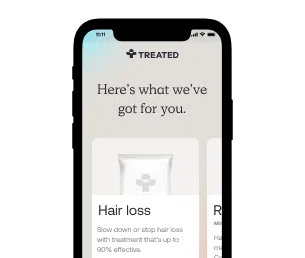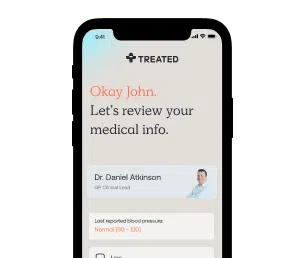Anaemia
Tablets to boost your red blood cell count.
Secure delivery
UK clinicians
Anaemia is a condition characterised by a lack of red blood cells, which leads to your organs not getting enough oxygen.
Answer a few questions about your health, and order anaemia treatment online to get treatments tailored to you. On a schedule that suits your lifestyle.
Anaemia is commonly associated with iron deficiency, but it’s actually not just a lack of iron - anaemia can refer to other vitamin deficiencies as well. Anaemia is essentially a lack of red blood cells, which can be caused by various things, but low levels of iron is the most common reason. So when someone mentions anaemia, they’re usually talking about iron deficiency.
Anaemia can impact your health and lead to a decrease in quality of life, so treatment can be crucial. Changing your diet can help, but often supplements are also necessary to quickly increase your red blood cells.
Anyone can get anaemia, especially if their diets aren’t rich in nutrients and they live a sedentary lifestyle. But some population groups are more at risk of developing anaemia than others.
Age can also be a big factor. Infants and children, from the age of six months to two years, can be at risk if the milk that they drink or food they eat isn’t fortified with iron. Teens can be a risk group too, especially during growth spurts, as well as people over the age of 65.
Women between the ages of 14 and 50 need more iron than men of the same age, and can be at a greater risk of iron deficiency as a result. This can be especially true during heavy periods, pregnancy, breastfeeding, or shortly after delivering a baby.
Anaemia is a very common condition, but luckily it’s often curable with a combination of dietary changes and vitamin and mineral supplements.
According to NICE, iron deficiency anaemia (the most common type) is thought to affect half a billion people in the world. About 2-5% of men and postmanopausal women have it, and in women of reproductive age, it’s thought to be much higher – affecting 38% of pregnant women and 29% of non-pregnant women.

How we source info.
When we present you with stats, data, opinion or a consensus, we’ll tell you where this came from. And we’ll only present data as clinically reliable if it’s come from a reputable source, such as a state or government-funded health body, a peer-reviewed medical journal, or a recognised analytics or data body. Read more in our editorial policy.
Anaemia can be temporary or long-term, and can range from mild to severe. In most cases, anaemia has more than one cause, and the most common causes of anaemia are a lack of vitamins and minerals, more commonly iron, folic acid, and vitamin B12. These deficiencies might be caused by a dietary issue, but they can also be caused by an underlying problem, so it’s important to consult a clinician so they can take a blood test.
The underlying conditions that can lead to anaemia will often need immediate treatment. These conditions include ulcers, gastrointestinal problems, blood disorders, and hormone deficiencies caused by thyroid disease. So it isn’t recommended to look for over-the-counter supplements if you think you might have anaemia; consulting a clinician is always the best thing to do.
In the early stages of anaemia, it can be so mild that you don’t notice any symptoms. But usually, as anaemia worsens, your symptoms will become more noticeable.
The most common symptoms of anaemia include: fatigue that persists all day and doesn’t get better with sleep; loss of breath; and getting tired easily during exercise.
In some cases you can become tired while doing regular day to day activities, or experience paleness and heart palpitations.
Some less common side effects can include dizziness, cold feet and hands, headaches and chest pains.
Untreated anaemia can greatly affect your quality of life, immune system, and lead to some other health issues, including:
The type of treatment will depend on the type of anaemia that you’re diagnosed with, but the most common treatment for anaemia is usually for you to take vitamin supplements, and change your diet to include foods rich in iron such as beans, nuts, liver, red meat, and spinach. This diet might be slightly different if you’re pregnant.
You’ll be given supplements in stronger doses than the ones you can get over-the-counter, and you’ll usually need to take them for around six months. After that period, a clinician will request another blood test to make sure that your iron and other vitamin levels are back to acceptable levels. And if not, your treatment might need to be extended.
Adding more vitamin C to your diet, or taking vitamin C supplements alongside the iron supplements, is often the best treatment for anaemia. This is because vitamin C helps your body absorb iron better.
You should always follow the instructions of our clinician to get the most out of your treatment.
Changing your diet to include more iron-rich foods can be very helpful, but if you’ve been diagnosed with anaemia and it’s severe enough, it’s still recommended that you take supplements as well.

How we source info.
When we present you with stats, data, opinion or a consensus, we’ll tell you where this came from. And we’ll only present data as clinically reliable if it’s come from a reputable source, such as a state or government-funded health body, a peer-reviewed medical journal, or a recognised analytics or data body. Read more in our editorial policy.
Have something specific you want to know? Search our info below, or ask our experts a question if you can’t find what you’re looking for.
Iron-Deficiency Anemia | National Heart, Lung, and Blood Institute (NHLBI). [online] Nih.gov.
Management of Iron Deficiency Anemia. Gastroenterology & hepatology, 11(4), pp.241–50.
Iron Deficiency Anemia. [online]

Iron tablets to supplement your diet and treat deficiency. Easily absorbed by your body.

Daily tablet for iron deficiency. Adjustable doses depending on your needs.

Prescription strength folic acid tablets. Reverse and prevent folate deficiency anaemia.

Increase your iron, increase your energy. Powerful tablets for anaemia.

B12 tablet you swallow every day. Fight your deficiency, regain your energy.

Registered with GMC (No. 4624794)
Meet Daniel
Registered with GPhC (No. 2202465)
Meet Sanjeda
Registered with GPhC (No. 2070724)
Meet Craig
Always read the leaflet that comes with your medication and tell us about any side effects you get.
We know health, but you know you.
Our experts tell you what’s safe, but you decide what’s best.
Answer a few questions and tell us about yourself. Get tailored advice from our clinicians so you can choose better.

Choose your treatment and how often you have it delivered.

We know things change. It’s the nature of life. We’ll check in regularly to make sure your treatment is still right for you.
Pause. Change. Skip. Start again. Any time you like.
Here are some other things we can help with.
Choose from our range of tablets and solutions. Get ongoing care and support from our experts.
Stop smoking treatments that can help you kick the habit forever, and reduce your risk of disease.
Tablets or injections. Tailored weight loss treatments combined with ongoing support from our experts.
We're making healthcare more about you. Sign up to our newsletter for personalised health articles that make a difference.
Disclaimer: The information provided on this page is not a substitute for professional medical advice, diagnosis, or treatment. If you have any questions or concerns about your health, please talk to a doctor.
We couldn't find what you're looking for.
Here's everything we treat. Or, if you're looking for something we don't have yet, you can suggest something.
If there’s a particular treatment or condition you’re looking for, tell us and we’ll look into it for you.
Submit your question here, or tell us if you’ve found an issue on our site.
We’ll get back to you very soon. We aim to respond to all queries in one working day.
You’re signed up to our newsletter. Keep an eye on your inbox for our latest update.
By clicking 'Subscribe now' you're agreeing to our Privacy Policy.
We’ve sent you an email asking you to confirm your email address.